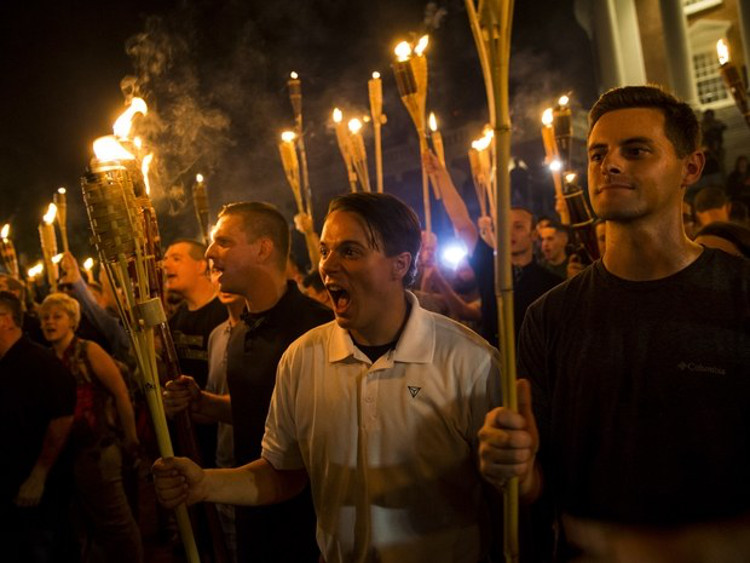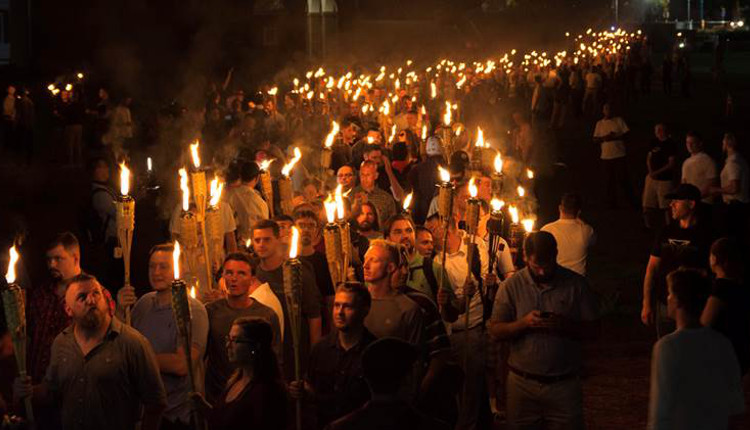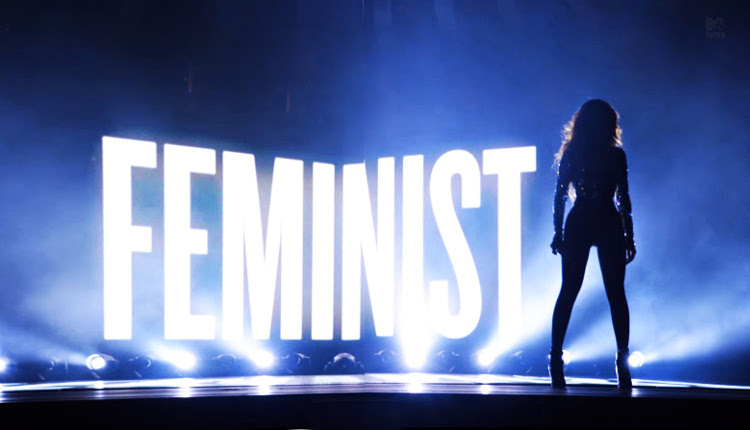Charlottesville, and How To Support Marginalised Communities Wherever You Are In The World
In the aftermath of such ugly events as those which unfolded in Charlottesville last week, it can be difficult to find meaningful ways to express our solidarity with marginalised communities. But it’s not impossible.
As white supremacists clashed against counter-protesters, killing one civil rights activist and leaving several others injured, Charlottesville has been dubbed the ugly wake-up call needed by many US citizens in recognising the country’s searing race problem. It has not only been amplified under Trump administration, but notably exacerbated by it.
[perfectpullquote align=”right” cite=”” link=”” color=”#8D3AF9″ class=”” size=””]Defending the right to wave the Confederate flag cannot be viewed solely as exercises of First Amendment rights, but as attempts to reinforce the centuries dated notion that white supremacy is the natural order of the world.[/perfectpullquote]
The statue of Robert E Lee, over which last week’s horrifying events occurred, is inarguably a symbol not only of the oppression of African Americans under slavery and Jim Crow laws, but of white power in the US in general. Protests in favour of its preservation and protection, as similar to those defending the right to wave the Confederate flag, cannot be viewed solely as exercises of First Amendment rights, but as attempts to reinforce the centuries dated notion that white supremacy is the natural and correct order of the world.
For those of us looking from the outside in, while we may add to the pile our own outrage and disgust at recent events via social media, it often feels there is little we can do by way of actual support for those whose communities are desperately threatened in a country that validated racism, misogyny and anti-immigrant sentiment the day it elected Donald Trump its president.
How do we condemn such deplorable events as those that unfolded in Charlottesville, and support those affected in a meaningful way?

Admittedly, as a white person, this is something I have grappled with. While living in a predominantly black neighbourhood in Washington D.C. I found it was easier to educate myself and be an ally; there were talks and lectures to attend, friends to speak to, niche bookstores to shop in. Since moving back to Ireland, however, the same opportunities do not exist with simple reason; we are not America and this is not our problem.
While I was living in D.C. it made sense to attune myself to the conversations happening around me, but wouldn’t I be leaving it all behind me after I returned to my real home? Wouldn’t it just disappear from my consciousness after that?
This is an argument that could easily be justified, but not one that has ever sat right with me. The fact is, I believe, regardless of where in the world we find ourselves, our actions can influence the heightened racial injustice currently unfolding in United States, and we can show real support and solidarity to those in need in a more tangible way than tweeting allows.
As heavily invested consumers of American popular culture, we have the power to amplify the voices that urgently need to be listened to, and support the work of those for whom more prominent platforms are unfairly kept out of bounds.
We can support marginalised people and their work by buying cinema tickets and books, by listening to and sharing podcasts, by following them on social media and sharing their work so that it reaches a wider audience. By choosing to invest our time and money in diverse stories and voices, we send editors, producers, publishers and other gatekeepers of popular culture the message that we want to see better representation on all fronts, and that we won’t settle for less.

As individuals, we can make the conscious decision to better educate ourselves by watching such documentaries as Ava DuVernay’s 13th (Netflix), which successfully argues that present day mass incarceration is an extended form of slavery in the United States.
Similarly, we can watch such documentaries as Last Chance U (Netflix), which offers a nuanced portrayal of young black men not often represented on screen, and intertwines the effects of poverty and education, and the hope sport and scholarships affords them in a society riddled with racial prejudice and a system designed to fail them.
We can learn from such writers as Tamara Winfrey Harris, Chimamanda Ngozi Adichie, Roxane Gay and Issa Rae, who write intelligently and ferociously on the subject of intersectional feminism as it relates to black women and, in the case of Rae, portray it both sharply and humorously through sitcom.
If possible, we can show our support to such projects as Matthew Cherry’s Hair Love by donating money via Kickstarter campaigns, which actively seek to correct the imbalance of racial representation on screen.
We can listen to the criticisms and concerns expressed by black people regarding topics such as erasure of history and cultural appropriation (Ta Nehisi Coates’ Atlantic article about the problems with HBO’s Confederate is a good example of this, as is Amandla Stenberg’s YouTube video, Don’t Cash Crop On My Cornrows)
We can listen to black celebrities, such as Viola Davis, Jesse Williams and Beyoncé, when they speak out about racial injustice not only in the entertainment industry but in American society at large, in whatever form they choose to do so.

We can criticise the way the media vilifies such artists as Kanye West and Nicki Minaj when they stand up against racial injustice in the music industry, and engage with the commentary surrounding white artists such as Katy Perry, Taylor Swift and Miley Cyrus, when they mock and appropriate black culture.
[perfectpullquote align=”right” cite=”” link=”” color=”#8D3AF9″ class=”” size=””]These efforts might seem minor and insignificant, and in the wake of such ugly events as Charlottesville, even trivial, but there is, as there has always been, power in education.[/perfectpullquote]
These efforts might seem minor and insignificant, and in the wake of such ugly events as Charlottesville, even trivial, but there is, as there has always been, power in education. The more conscious and political we become in what we consume, and the more motivated we become to listen to the voices of the marginalised, the better the chance we have of even partially balancing the disproportionate number of white, privileged voices currently dominating political and social discourse in the United States. As feminist writer Rebecca Solnit says, ‘who is heard and who is not heard defines the status quo.’
It was, unsurprisingly, a group predominantly made up of white men that gathered in Charlottesville last week – a sampling of exactly the group that has held power of speech in the United States for centuries, whose privilege, afforded by a lack of police intimidation, systematic harassment and abuse in their lives, has helped them maintain that power. Their voices have been repeatedly amplified while others have been shut down, silenced and abused for speaking up.
It might seem like there is little we can do by way of action from the outside, but the most important thing we could ever do we still can: we can listen to the voices being silenced. These are the voices that most need to be heard.
